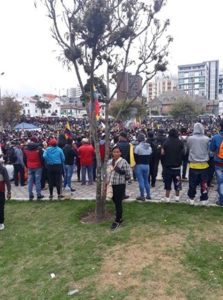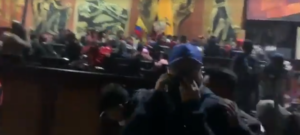The Rainforest Action Group is deeply concerned about the implications of the State of Emergency declared by Ecuadorian president Lenin Moreno on October 3rd. The action gives police and military the power to use extreme force to repress the widespread mobilisation of the populace occurring throughout Ecuador after the implementation of austerity measures known as the “paquetazo” (package) on October 1.

The US $20 billion fiscal reform package includes axing fuel subsidies – a move that saw diesel prices rise from US$1.03 to $2.30 per gallon, and petrol rise to US$2.39 from $1.85. Public service wages were cut by 20 per cent, and workplace security and job security safeguards removed. Thousands of public-sector employees were also dismissed and education and healthcare spending slashed. The resulting protests have seen hundreds injured and at least one dead, with police shooting unarmed protesters and the government leaving the capital over safety concerns. Hundreds of people have also been arrested.
“The reforms by the Ecuadorian government are part of IMF mandates that seek to open Ecuador further to international investment, and pave the way for widespread copper and gold mining despite resistance from the population. Austerity measures in a country where the level of structural poverty sits at 25.5% and extreme poverty levels of 9.5% is unfathomable. Given the isolated terrain of much of Ecuador, the fuel price rises will see the poorest Ecuadorians and small-scale farmers hit the worst,” says Rebekah Hayden.
“The move directly implicates Australian mining companies in the repression of the populace, who overwhelmingly voted last year against mining in Indigenous territories and protected forests in the Amazon and Andes. Despite this, the government continues to move ahead with plans to increase mining concessions, axing taxes so that mining companies can operate with lower overheads, and providing armed forces to ensure the security on the sites of these proposed mines. The IMF loan was provisioned on foreign investment, particularly the strategic mining projects such as SolGold’s proposed Cascabel mine which acts as collateral for the loans.” Ms Hayden added.
Australian mining companies are leading investment in Ecuador, holding almost 30% of mining concessions across the country, totalling 536,101 hectares in early 2019.
“Australian mining companies like to promote mining as an opportunity to provide jobs and increase local wealth, however these austerity measures by the government indicate that local communities will be far worse off after foreign investment than they were before,” Rebekah stated.

The Confederation of Indigenous Nations of Ecuador (Conaie) released a statement in mid 2018 denouncing the Government’s selling of around 2 million hectares of Indigenous territories and protected forests to mining companies, and declaring a unilateral stance against all industrial foreign investment projects, including mining, oil and hydroelectricity, in indigenous lands. Last week, in response to the release of the austerity package, indigenous people apprehended and detained around 50 police and military personnel trying to enter communities in the Andean provinces of Chimborazo and Imbabura. To date, many of those held have not been released. In a statement on 3rd October, Conaie declared: “Military and police who approach indigenous territories will be detained and subjected to indigenous justice.’
Meanwhile, also on 3rd October, protestors burned down a mining camp at Río Blanco in the province of Azuay. Río Blanco, owned by Chinese company Ecuagoldmining, has been for several years a social and political flashpoint. Sustained community resistance against the gold mine resulted in a legal case which in June 2018 forced the project to shut down. However, as part of his swathe of new enforcements following the signing of the IMF deal, President Moreno promised to do whatever it took to re-open Río Blanco.
In recent months there have been a number of other declarations released by communities denouncing moves to mine their land. They say they were not consulted about plans to mine. An assembly in the province of Intag on August 20th was attended by 1500 people, who released a statement giving mining companies, including BHP (five concessions in the area) and Gina Rinehart’s Hanrine, two months to withdraw from their communities.
On August 23rd, the Shuar Arutam Indigenous People’s government declared itself free of mining, demanding the exit of mining companies which include Australian companies SolGold, Andrew Forrest’s Fortescue Metals Group, Newcrest (who part-owns the flagship gold mining project Fruta del Norte) and BHP. More than 50% of Shuar territory is covered with mining concessions, and nearly 100% is concessioned to oil companies. At this moment, Shuar Arutam demonstrators are being harshly treated by the military, being gassed, shot at and beaten.
“Australian companies are naively pushing ahead with mining in communities that do not want them to operate on their land, in an environment that is increasingly fraught, and at a time when global concerns about climate change require deeper scrutiny of any new mines – particularly in such vital forests as the Amazon. Any mining in Ecuador can only go ahead with increasing force against the populace – making Australian companies directly responsible for any fatalities that result.” Ms Hayden concluded.
As this is being written, Ecuador is in lockdown due to a nationwide strike and escalating unrest. Citing security fears, the government has temporarily moved from the capital, Quito, to Guayaquil.
Contacts and full media release here.
